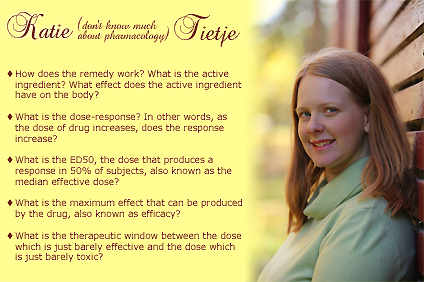As I wrote yesterday, Katie Tietje (Modern Alternative Mama) claims that natural remedies work to cure disease.
She provided no evidence for that claim, but that doesn’t mean that it is impossible.
Let’s look at what Katie would need to know in order to determine whether natural remedies work:
The study of drug efficacy and safety is pharmacology. Pharmacology can be roughly divided into two areas: pharmacodynamics, how the substance acts on the body, and pharmacokinetics, how the body acts on the substance.
[pullquote align=”right” color=”#762b1d”]What are the pharmacodynamics and pharmacokinetics of natural remedies?[/pullquote]
Here are some basic questions that must be answered to find out how the drug works on the body:
- How does the drug work? What is the active ingredient? What effect does the active ingredient have on the body?
- What is the dose-response? In other words, as the dose of drug increases, does the response increase?
- What is the ED50, the dose that produces a response in 50% of subjects, also known as the median effective dose?
- What is the maximum effect that can be produced by the drug, also known as efficacy?
- What is the therapeutic window? For every drug, there exists some concentration which is just barely effective and some dose which is just barely toxic. Between them is the therapeutic window where safe and effective treatment will occur.
Here are some basic questions that must be answered to find out how the body interacts with the substance:
- What is its half life?
- What is its bioavailability?
- How is it removed from the body?
- Does it have effects on other parts of the body besides its stated therapeutic effect?
What does Katie Tietje know about the pharmacology of the natural remedies that she recommends? Generally nothing. She doesn’t know the mechanism of action, the dose response or the side effects. Therefore, she has no evidence that the natural remedies that she peddles are either safe or effective.
Determining drug efficacy and safety is complex. It is absolutely imperative to study the pharmacodynamics and pharmacokinetics of a substance before anyone can claim that it is effective or safe. In the case of Katie Tietje’s natural remedies, these questions have not even been asked, let alone answered.


